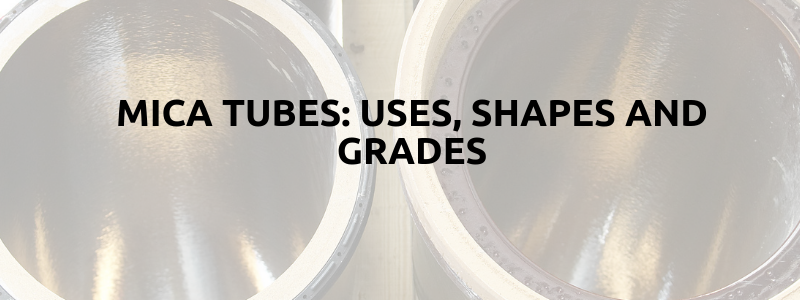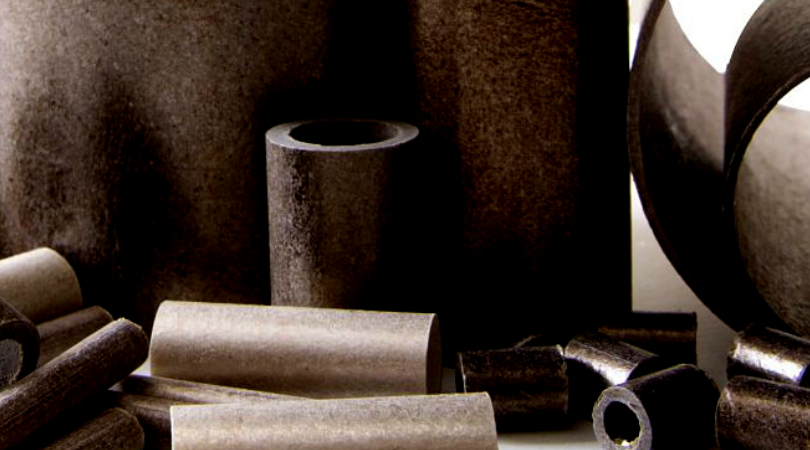
As a supremely versatile material, mica comes in a variety of forms, suitable for different applications, across a diverse range of industries. Elmelin’s range of mica products reflects this versatility. Mica tube is one such product, and in fact mica tubes themselves have many different uses and come in various shapes and grades.
Grades of Mica Tubes
We manufacture rigid mica tubes from both muscovite (white) and phlogopite (green) mica. Mica tubes retain the typical natural mineral qualities of mica in their high heat resistance and electrical insulation.
In terms of their function, mica tubes cover a broad spectrum, from insulating electrical appliances to their use in electrical motors and other equipment.
Elmtube mica grades are: MPSB-M (muscovite) and MPSB-P (phlogopite).
The inner diameters of mica tubes range between 5mm and 260mm, and the tubes come in standard lengths of either 1000mm or 1200mm.
Tubes are lightweight, adding to their versatility and ease of installation, but retain their durability. They combine electrical and mechanical strength, with flexural or bend strength.
In this sense, while they are rigid, mica tubes are also highly adaptable.
To manufacture mica tubes, we bond mica with another resin-based substance, such as treated glass fabric or a silicone.
This bonding process ensures mica tubes have excellent insulating properties with resistance to a number of chemicals, and can also be manufactured to be waterproof.

More Than Simply Tubular
Mica tubes come in different diameters and lengths, but also shapes.
Elmelin manufactures specialist tubes to order and these can also be square or rectangular, depending on the client’s requirement.
An Insulation Sleeve Material
Throughout the electrical industry, mica tubes are used as insulation sleeves.
Mica tubes are ideal for this function because of their cost-effectiveness, adaptability, strength and resistance.
In everyday electrical appliances, mica tube provides an essential insulator around which a nichome coil heating element is wound.
One widely recognised and widely used example of this in a consumer appliance is the hairdryer.
In this tubular form, mica resists heat but has a good dielectric strength, which means it can help maintain and improve both the safety and efficiency of electrical products.
Mica tube is used in heat guns, as well as in toasters and various commonplace white goods.
In cooking appliances, mica’s low thermal conductivity means that it can effectively and efficiently manage the flow of energy from hot to cold, minimising energy loss.
For these kinds of appliances, mica tube offers excellent performance combined with energy reduction and safety.
Mica Tube in the Electronics Industry
Mica tube is perfect for the manufacture of key electrical components.
Where electrical circuits require a high-precision performance, mica tubes offer solid reliability and stability as capacitors and resistors. They can help with ensuring low energy loss and work well in high frequency settings.
Mica in this form is found in defence electronics, in high power broadcast transmitters and in coupling and time-constant circuits.
Mica’s natural resistance to high temperatures means that as a resistor, it is well-suited for high power and high-speed electric applications. Here, the element in the resistor is wound onto a mica tube.

Enabling Power Electronics
The application of solid state electronics to process electric power requires that electrical instruments perform high speed, fully integrated functions.
As an insulator, mica tube helps ensure these levels of performance, drawing on its excellent dielectric strength and heat conductive properties. It can resist temperatures up to 650°C, and withstand very powerful electric fields.
Supporting Electric Arc Furnaces
Electric arc furnaces are essential for manufacturing steel from 100% scrap metal. They can do this because they require much less energy than that required for primary steel making directly from ores. Electric arc furnaces are more flexible in operation than blast furnaces, but require large amounts of electrical power.
These types of furnaces heat charged material with an electric arc. It relies on a three-way electrical supply, which then heats the charge by a current passing through it, and from the radiant energy coming from the arc.
The temperature of the electric arc can reach 3000°C, causing its electrodes to glow as it operates.
With this intensity of heat, there must be a reliable regulating system, which will maintain constant power and current during melting operations.
Consequently, insulation of electric arc furnaces requires high-performance components, including mica tubes. Applications for mica tube in electric arc furnaces include insulation for electrode arms, mast arms and pivot tubes.
Rigid but Flexible
Mica tubes are rigid in construction but flexible in application. They provide a great many insulation solutions across different industries and sectors, supporting safety and efficiency and helping maintain a high degree of technical excellence in industrial performance and manufacturing.
Are mica tubes the solution your industry is looking for? We specialise in meeting the specific requirements of our customers, whether this is from our standard range of mica-based products, or by supplying bespoke solutions.
Please contact us now on +44 20 8520 2248, email sales@elmelin.com, or complete our online enquiry form. We’ll get back to you as soon as we can.
